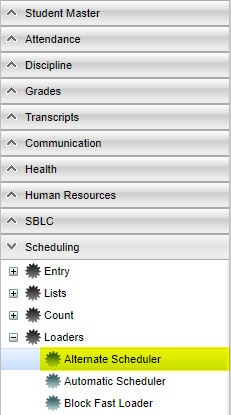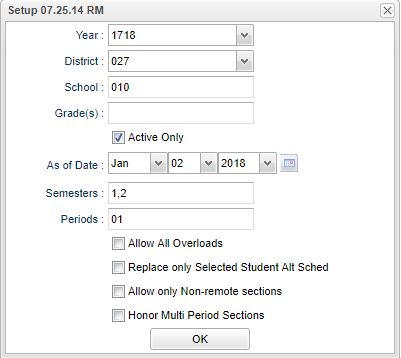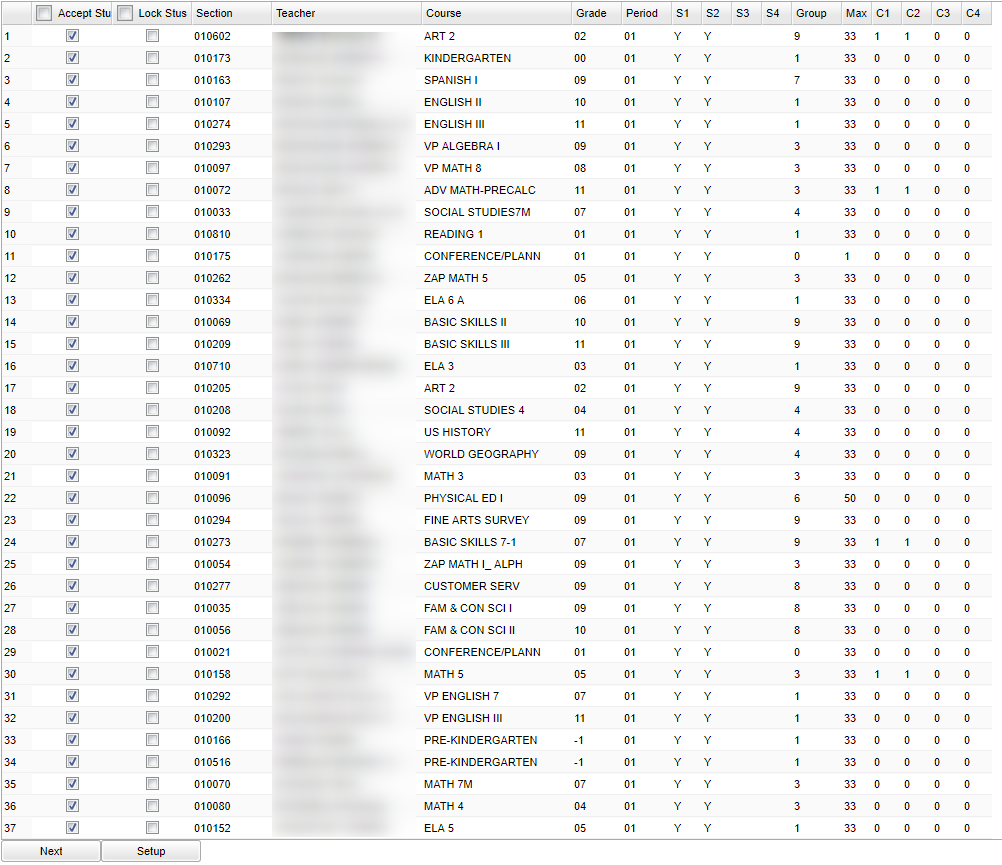Alternate Scheduler
Overview Notes for the Alternate Scheduler
The Alternate Scheduler program assigns a student to an alternate teacher for each class period in a semester or year. The student reports to an alternate teacher when the original teacher is absent. The student has a regular “Class Schedule” and an “Alternate Schedule” to be used if a teacher on the regular schedule is absent.
Video How-to
Menu Location
On the left navigation panel, select Scheduling > Loaders > Alternate Scheduler.
Setup Options
Year - Defaults to the current year. A prior year may be accessed by clicking in the field and making the appropriate selection from the drop down list.
District - Default value is based on the user's security settings. It will be limited to their district only.
School - Default value is based on the user's security settings. If the user is assigned to a school, the school default value will be their school site code.
Grade - - Leave blank or select all to include all grade levels. Otherwise, choose the desired grade level.
Active Only and As of Date - This choice will list only those students who are actively enrolled as of the date selected in the date field.
Semester -Tto select all semesters leave the field blank or click in the field and select the check box at the top of the list of semesters; to select one or more semesters click in
the field and select the desired semester(s) from the popup list.
Class Period - A numeric value that indicated the period of the day a course is offered according to the Master Schedule Editor. To select all class periods leave the field blank or
click in the field and select the check box at the top of the list of class periods; to select one or more class periods click in the field and select the desired class period(s) from the
popup list.
Allow All Overloads - Select this option to overload the sections above the max value set in the sections. This will result in all of the students receiving an alternate teacher for
the semester and class period. If this is not selected, there is a good change that some students will not be alternately scheduled to a different teacher.
Replace ONLY Selected Stus Alt Sched - Select the option to delete the OLD alternate schedule only for the students selected. If you DO NOT select this option, the program will clear
out ALL alternate schedules (ALL alternate schedules will be deleted) for all students for the selected year, district, and school.
Allow only Non-remote sections - Prevents remote classes from being used in the alternate schedule.
Honor Multi Period Section - Prevents a multi-period class from being used in the alternate schedule for a single-period class and causing conflicts.
Ok - Click to save your selections.
To find definitions for standard setup values, follow this link: Standard Setup Options.
A "Continue with the following setup" dialog box will appear. Click "Yes" to continue, or "No" to cancel the process.
After completing the setup box information, the master schedule selection screen will be presented. This is where the user will choose the criteria to run the Alternate Scheduler.
Main
Column Headers
Section - Section number of courses/subjects as generated from the Master Schedule Editor
Teacher - Name of the teacher of the course in which the student is enrolled
Course Name/Course Code - Name(s)/Codes(s) of the course(s) in which the student is enrolled or as listed in the Master Schedule or Course Catalog
Grade, Grd - Grade level of the student and/or course
Period - Class period(s) of the course(s) in which the student is enrolled
Sem, S1, S2, etc. - Semester, Ex: 1st semester, 2nd semester
Group
Max
Count, C1, C2, etc. - Student count in each course
Accept Students - Placing a check will allow the teacher/section to accept alternates. All columns are selected as a default to allow for ALL sections to accept students. You must
“uncheck” sections that do not or cannot receive alternate students.
Lock Students - This selection is used to 'tell' the program which sections will keep students and not send the students to alternate teachers. These sections will be skipped in :the
schedule selection process.
To find definitions of commonly used column headers, follow this link: Common Column Headers.
All columns are NOT selected as a default to allow for ALL sections in the original schedules to be alternately scheduled.
To avoid overloading teachers who have more than one section for the same semester, and class period, select only one of the sections, UNLESS you select to NOT overload the teachers.
Ex: PE Teacher has PE II, PE III at the same period, only select one of the two classes.
If the user selects to NOT overload the teachers, selecting all sections for the same class period for a teacher will help to schedule more students, while maintaining the max load criteria
for a teacher's class period. If you select to use the section with the larger load count, the program will be able to better balance the load between the teachers.
Make sure to uncheck “Accept Stus” for classes such as Coord/Supv, Conference/Planning, etc... that should not get alternate students.
Classes with a large number of students (29-33) may need to be unchecked since there are large numbers on a daily basis.
Just remember not to omit too many classes since the students are divided among the remainder of teachers.
Bottom
Next - Bottom left of the screen.
A student selection screen will be displayed. To select all students in the list, click check box in front of the "Sel" column heading.
Unselect any student that the user does NOT want to create an alternate schedule for.
Setup - To return to setup options box.
How To
Print Alternate Student Schedules
Print Alternate Class Rosters for Teachers
Initializing the Master Schedule


